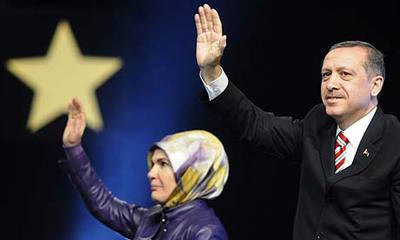
Turkish Prime Minister Recep Tayyip Erdogan met with European Commission officials in Brussels last week to discuss his country’s accession negotiations. The Prime Minister reaffirmed his commitment to the process, and appointed Egemen Bagis, a close personal adviser, to be his chief negotiator with Brussels.
The talks were tense at times, with Prime Minister Erdogan even threatening at one point to halt cooperation on the Nabucco gas pipeline project if membership talks were not accelerated. The importance of the project, which is the centerpiece of Europe’s strategy to diversify its natural gas supply away from Russia, was underscored by the recent row between Russia and Ukraine. At the same time, some in Europe are growing increasingly frustrated with the slow pace of Ankara’s political reforms.
Both Turkey and Europe would be wise to take a deep breath, temper their expectations of one another, and continue to cooperate toward an eventual marriage. Ankara cannot expect Brussels to be enthused by its modest first steps toward major political reform and Brussels must understand that a country as large, complex and with as rich a history as Turkey cannot escape from its authoritarian past without difficulty.
After sweeping into power in 2002, Erdogan’s Justice and Development Party (AKP) government promised to enact a bold reform agenda and to set Turkey on the path toward EU membership. To this end, the government’s initial political reforms included modifying state institutions to ensure civilian control over the military and granting greater language and broadcasting rights to the country’s Kurdish minority. Brussels welcomed these reforms as positive first steps toward liberalization and as a result agreed in December 2004 to begin accession negotiations.
Since then, however, the pace of Turkey’s reform program has slowed to a crawl as deep fissures within the state have come to the fore. Over the past two years, the Constitutional Court came within one vote of ousting the ruling AKP from power, the government has arrested scores of journalists, military officers and union officials as part of its ongoing Ergenekon case, and the Kurdish conflict in the southeast has deepened. Europe can be forgiven for being nonplussed.
But the appropriate response is not to question whether Turkey belongs in Europe, as Nicolas Sarkozy has done, but to make clear that Europe is prepared to help Turkey liberalize so that it can eventually qualify. Indeed, both Ankara and Brussels would do well to acknowledge that Turkey remains in a period of political transition and that enduring institutional reforms will take time to become fully accepted by all of the key stakeholders.
Civilian authority is slowly usurping the military’s power – a development that in the long run is likely to lead to greater stability and democratic accountability. But in the short-run, such a seismic shift in the fabric of the state leads to conflict, instability, and stalemate.
This is evidenced by the government’s recent move to adopt a more strident policy toward the Kurds, which is most likely the result of an agreement – tacit or explicit – with the military.
While European governments are correct to criticize the policy shift, the best way to put the reform process back on track is for Europe to remain engaged and to make clear that reformers will be rewarded. Whether the current impasse constitutes a speed bump or a permanent roadblock to reform will depend in large part upon whether Brussels can walk a fine line and leave the door open to full membership without compromising its core principles.
–Ben Katcher


2 comments on “Walking a Fine Line: Turkey and the EU”